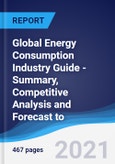The Global Energy Consumption industry profile provides top-line qualitative and quantitative summary information including: Sector size (value and volume 2016-20, and forecast to 2025). The profile also contains descriptions of the leading players including key financial metrics and analysis of competitive pressures within the Sector.
Key Highlights
- The energy consumption sector is defined as the energy consumption by industry, transport, residential, commercial, agricultural, and fishing consumers and markets.Volume is defined as consumption of millions of tonnes of oil equivalent of coal & coal gases (including coal and peat), oil & oil products (including crude oil), natural gas, nuclear, and renewable energy (including hydro, geothermal, solar and biofuel). Value refers to the sum of segments values, as the product of volume and average prices for each type of energy (renewable and nuclear prices estimated from average electricity retailing prices. All market data and forecasts are represented in nominal terms (i.e. without adjustment for inflation) and all currency conversions used in the creation of this report have been calculated using constant 2020 annual average exchange rates.
- The length of the pandemic and restrictions introduced by varieous countiries are still difficult to predict, though many governments had introduced the national lockdowns and temporarily banned sales of products and services that are deemed "non essential". As the length of the pandemic and its impact on this market is not certain, the data used in this report has been modelled on the assumption of a crisis scenario and has taken into consideration forecast impacts on national ecomomics.
- The global energy consumption sector had total revenues of $4,479.5bn in 2020, representing a compound annual growth rate (CAGR) of 2.9% between 2016 and 2020.
- Sector consumption volume increased with a CAGR of 0.5% between 2016 and 2020, to reach a total of 11,909.5 mtoe in 2020.
- The value of the global energy consumption sector declined by 12% in 2020 as a result of the COVID-19 pandemic, which reduced energy demand.
Scope
- Save time carrying out entry-level research by identifying the size, growth, major segments, and leading players in the global energy consumption Sector
- Use the Five Forces analysis to determine the competitive intensity and therefore attractiveness of the global energy consumption Sector
- Leading company profiles reveal details of key energy consumption Sector players’ global operations and financial performance
- Add weight to presentations and pitches by understanding the future growth prospects of the global energy consumption Sector with five year forecasts by both value and volume
Reasons to Buy
- What was the size of the global energy consumption Sector by value in 2020?
- What will be the size of the global energy consumption Sector in 2025?
- What factors are affecting the strength of competition in the global energy consumption Sector?
- How has the Sector performed over the last five years?
- What are the main segments that make up the global energy consumption Sector?
Table of Contents
1 EXECUTIVE SUMMARY
2 Introduction
3 Global Energy Consumption
4 Energy Consumption in Asia-Pacific
5 Energy Consumption in Europe
6 Energy Consumption in France
7 Energy Consumption in Germany
8 Energy Consumption in Italy
9 Energy Consumption in Japan
10 Energy Consumption in Australia
11 Energy Consumption in Canada
12 Energy Consumption in China
13 Energy Consumption in The Netherlands
14 Energy Consumption in Spain
15 Energy Consumption in The United Kingdom
16 Energy Consumption in The United States
17 Company Profiles
18 Appendix
List of Tables
List of Figures
Companies Mentioned (Partial List)
A selection of companies mentioned in this report includes, but is not limited to:
- Royal Dutch Shell plc
- Exxon Mobil Corporation
- China Petroleum & Chemical Corp
- Indian Oil Corporation Limited
- ENEOS Holdings Inc.
- OAO Gazprom
- Total S.E.
- Electricite de France SA
- Engie SA
- E.ON SE
- RWE AG
- EnBW Energie Baden-Wuerttenberg AG
- Vattenfall AB.
- Eni S.p.A
- Edison S.p.A.
- The Tokyo Electric Power Company Holdings., Incorporated
- Tokyo Gas Co., Ltd.
- GS Caltex Corp
- Origin Energy Limited
- BHP
- AGL Energy Limited
- Suncor Energy Inc.
- Husky Energy Inc
- Imperial Oil Limited
- PetroChina Company Limited
- China Shenhua Energy Co Ltd
- China National Petroleum Corporation
- Equinor ASA.
- Iberdrola, S.A.
- Enel SpA
- Naturgy Energy Group SA
- BP Plc
- Centrica plc
- EDF Energy Holdings Ltd
- SSE Plc.
- Southern Company Gas
- Duke Energy Corporation
- NextEra Energy, Inc.








